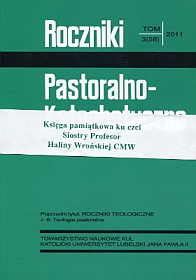Family Pastorate of Disabled People
Abstract
The Church points to the fact that disabled people have the right to get married and start a family. This right results from those people’s personal dignity that has been given to them by God – the Creator. The possibility to start marital-familial communities by the disabled is a challenge for pastorate, as disability of the spouse negatively influences the realization of all the functions of the family. The basic role in the pastorate of the families of disabled people is played by the parish. Parish pastors should meet the spiritual and material needs of the disabled and their families. Their work should be permanent and systematic. Pastorate realized on the higher level, especially on the level of the diocese, has a great significance. It complements parish pastorate, meeting the spiritual, psychological, rehabilitation and social needs of the disabled and their families. A similar role is played by associations and foundations that are guided in their work by the Church’s social teaching.
References
Bartoszek A.: Przeżywanie wiary oraz wartości moralnych we wspólnocie osób niepełnosprawnych umysłowo. W oparciu o doświadczenia Ośrodka dla Niepełnosprawnych „Najświętsze Serce Jezusa” w Rudzie Śląskiej. W: Osoby niepełnosprawne w życiu społeczeństwa i Kościoła. Red. A. Bartoszek, D. Sitko. Katowice–Ruda Śląska 2003 s. 209-222.
Fiałkowski M. Duszpasterstwo niewidomych. W: Duszpasterstwo specjalne. Red. R. Kamiński, B. Drożdż. Lublin 1998 s. 191-204.
Lipiec D.: Duszpasterstwo niepełnosprawnych w parafii. „Perspectiva” 8:2009 nr 2 s. 107-124.
Półtorak K.: Duszpasterstwo niesłyszących. W: Duszpasterstwo specjalne. Red. R. Kamiński, B. Drożdż. Lublin 1998 s. 157-190.
Sitko D.: Rola warsztatów terapii zajęciowej w systemie wspierania osób niepełnosprawnych. Z doświadczeń Ośrodka dla Niepełnosprawnych „Najświętsze Serce Jezusa” w Rudzie Śląskiej-Halembie. W: Osoby niepełnosprawne w życiu społeczeństwa i Kościoła. Red. A. Bartoszek, D. Sitko. Katowice–Ruda Śląska 2003 s. 151-176.
Żywczok A.: Postawa miłosiernej sprawiedliwości wobec niepełnosprawnych. Jej implikacje etyczne i pedagogiczne. W: Etyczne i duchowe potrzeby osób niepełnosprawnych. Red. R. Buchta, K. Sosna. Katowice 2007 s. 59-69.

